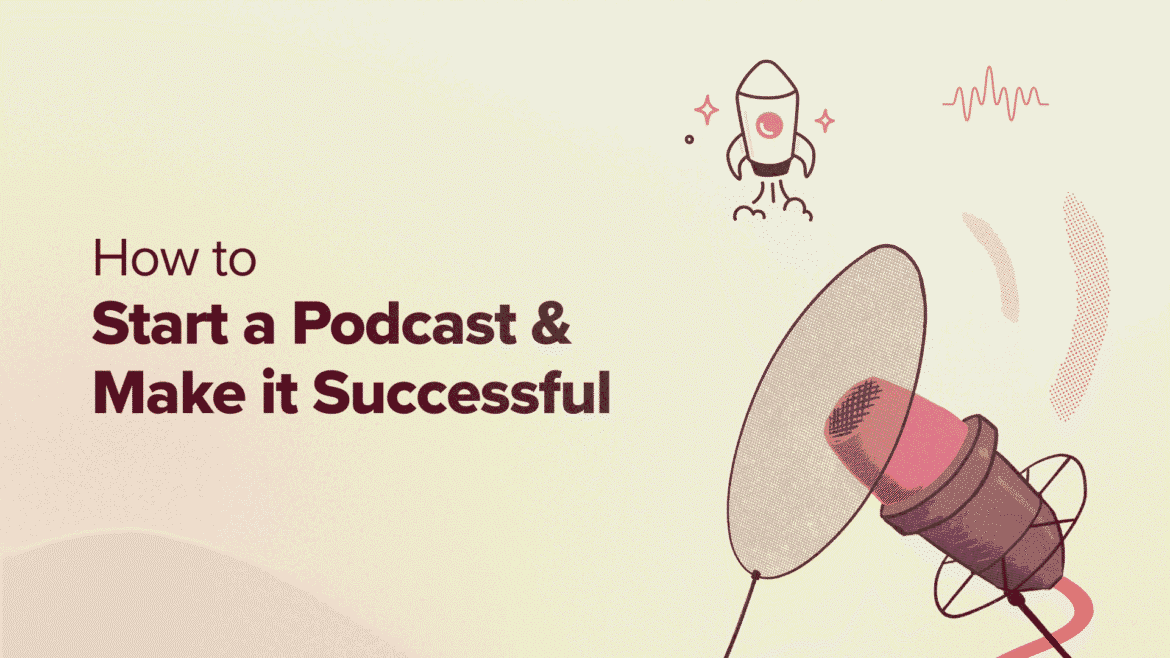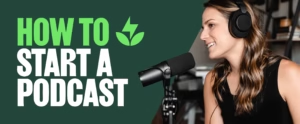Introduction
Podcasting has become one of the fastest-growing mediums for sharing ideas, telling stories, educating audiences, and building communities. Over the past decade, the rise of podcasts has transformed the way people consume content. Listeners tune in during commutes, workouts, or daily routines, creating a strong bond between hosts and audiences. For individuals and businesses alike, podcasting presents a golden opportunity to connect with a dedicated following. Starting a successful podcast does not require a broadcast studio or massive investment. Instead, it requires creativity, planning, consistency, and the ability to provide value in a way that resonates with listeners.
The beauty of podcasting lies in its accessibility. Unlike traditional media, it allows almost anyone with a microphone and a story to share their voice with the world. However, creating a podcast that stands out among millions of shows requires more than hitting the record button. From identifying a niche and crafting engaging content to building an audience and monetizing the platform, each step plays a critical role in shaping success.
Understanding the Podcasting Landscape
Before beginning a podcast journey, it is essential to understand the industry’s current state. Podcasting has grown into a multibillion-dollar market, with platforms like Spotify, Apple Podcasts, and Google Podcasts leading the distribution channels. Millions of shows already exist, covering topics ranging from business and self-improvement to true crime and entertainment. This variety highlights both the opportunities and the challenges. On one hand, it demonstrates that there is a space for every voice and niche. On the other, it means that competition is intense, and only high-quality, consistent podcasts thrive.
Listeners are also more selective today than ever before. They expect clear audio, compelling stories, and consistent publishing schedules. Attention spans are limited, and with so many options available, poorly planned or inconsistent shows quickly lose their audience. At the same time, niche audiences are highly loyal. Even small podcasts with a targeted theme can attract dedicated listeners who tune in week after week, making them valuable platforms for influence and monetization.
Identifying a Niche and Audience
One of the first and most important steps in starting a podcast is identifying a niche. A successful podcast is not about speaking to everyone but about connecting deeply with a specific group of people. The chosen niche should reflect both the host’s passion and the audience’s demand. For example, someone with expertise in personal finance might focus on practical tips for young professionals. Another person might create a show exploring entrepreneurship in emerging markets.
Defining the target audience goes hand in hand with choosing the niche. Knowing who the podcast is for shapes the format, tone, and content strategy. For instance, a podcast aimed at busy professionals may focus on short, actionable episodes, while one targeting entertainment enthusiasts may feature longer, conversational formats. Conducting basic research—reading online forums, analyzing competitors, and surveying potential listeners—can provide insights into audience needs and expectations.
Clarity in this stage helps avoid one of the most common mistakes new podcasters make: creating content that lacks focus. Without a clear direction, podcasts struggle to retain listeners, as the audience cannot connect with a show that feels scattered. A strong niche builds loyalty and encourages word-of-mouth growth.
Planning the Podcast Format
Once the niche and audience are clear, planning the structure of the podcast becomes essential. A well-defined format provides consistency, making the podcast easier to produce and more enjoyable to follow. Formats vary widely, including solo episodes where the host shares expertise, interview-based shows that bring in guests, panel discussions, narrative storytelling, and hybrid models that combine different approaches.
The choice of format should align with the podcast’s goals. For example, an educational show might benefit from structured solo episodes, while a show focused on industry insights could thrive on guest interviews. Episode length is another factor to consider. While podcasts can range from ten minutes to over two hours, consistency matters more than length. If the audience expects thirty-minute episodes, delivering that regularly creates reliability.
Planning also involves creating an outline for each episode. A clear flow—introduction, main content, and conclusion—keeps the show engaging and avoids unnecessary tangents. At the same time, flexibility is important to maintain a natural and conversational feel.
Equipment and Technical Setup
One of the most common misconceptions about podcasting is that it requires expensive equipment. While professional studios use high-end gear, beginners can start with basic yet effective tools. A quality microphone is the most important investment, as clear audio significantly impacts listener retention. Even with great content, poor sound quality drives audiences away quickly.
In addition to a microphone, headphones, a pop filter, and basic audio editing software are useful. Free or affordable tools such as Audacity or GarageBand allow beginners to record and edit without major expenses. As the podcast grows, upgrading equipment such as mixers, soundproofing, and advanced editing tools can enhance production quality.
Equally important is choosing a hosting platform. Podcast hosting services store audio files and distribute them to directories like Spotify and Apple Podcasts. Reliable hosts provide analytics, storage, and tools for growth. Selecting the right host ensures that episodes are accessible and trackable, giving creators insights into audience behavior.
Crafting Engaging Content
Content is the heart of every podcast. No amount of marketing or equipment can compensate for uninspiring episodes. To keep listeners engaged, podcast content must provide value, whether through entertainment, education, or inspiration. Storytelling plays a powerful role, as humans naturally connect with narratives. A podcast that weaves stories into its episodes captures attention and creates memorable experiences.
Preparation is key. While some hosts prefer spontaneous conversations, having a plan for each episode helps maintain structure and relevance. Researching guest backgrounds, preparing questions, or outlining talking points ensures smoother delivery. At the same time, authenticity should not be lost. Audiences value genuine conversations and personal touches, which often separate podcasts from other forms of media.
Consistency in publishing is another content-related factor. Whether episodes are released weekly, biweekly, or monthly, sticking to a schedule builds trust. Listeners incorporate podcasts into their routines, and irregular publishing risks losing momentum.
Growing and Engaging the Audience
Launching a podcast is only the beginning; building an audience requires active promotion. A strong online presence is essential. Creating a dedicated website or landing page allows listeners to learn about the podcast, access episodes, and connect with the host. Social media platforms amplify reach, with clips, quotes, and behind-the-scenes content driving engagement.
Collaboration also fuels growth. Inviting guests with established audiences can attract new listeners, while cross-promotion with other podcasters builds credibility and expands reach. Encouraging listeners to subscribe, leave reviews, and share episodes strengthens visibility in podcast directories, where algorithms often favor shows with higher engagement.
Engagement goes beyond attracting new listeners. Successful podcasts create communities. Encouraging listener feedback, answering questions, or creating discussion groups fosters loyalty. A sense of belonging keeps audiences connected and invested in the podcast’s growth.
Monetization Opportunities
Once a podcast builds a stable audience, monetization becomes a realistic option. Advertising is the most common method, with sponsors paying to reach engaged listeners. However, ads are not the only route. Podcasters can also explore premium content, merchandise, live events, crowdfunding, or affiliate partnerships.
The key to monetization lies in alignment with the audience. Irrelevant or intrusive ads harm trust, while carefully selected partnerships enhance credibility. Many podcasters also use their shows as platforms to promote their own businesses, courses, or services, creating indirect but powerful revenue streams.
It is important to note that monetization usually comes after consistent effort. Building a loyal audience should remain the priority in the early stages, as financial success naturally follows from sustained growth and engagement.
Overcoming Challenges
Like any creative venture, podcasting comes with challenges. Consistency is one of the most common obstacles, as maintaining a regular schedule requires time and dedication. Many podcasts fail within the first few months because creators underestimate the commitment involved.
Another challenge lies in standing out in a crowded market. Unique positioning, high-quality production, and authentic storytelling are critical to differentiation. Technical hurdles such as editing, equipment setup, or distribution may also discourage beginners, but these can be overcome with practice and accessible resources.
Listener growth may initially feel slow, testing patience and persistence. However, with continued effort, steady promotion, and a focus on value, growth tends to compound over time.
Final Thoughts
Starting a successful podcast is both an art and a discipline. It combines creativity with strategy, passion with persistence. From identifying a niche and planning the format to crafting engaging content and growing an audience, every step contributes to building a platform that resonates with listeners. Challenges such as competition, consistency, and technical hurdles are real, but they can be overcome with determination and clarity of vision.
Podcasting is more than just recording conversations—it is about building relationships, sharing ideas, and creating lasting impact. Whether pursued as a hobby, a brand extension, or a business venture, podcasting has the potential to transform voices into influential platforms. For those willing to commit to the process, the journey of starting a podcast can be as rewarding as the destination itself.

